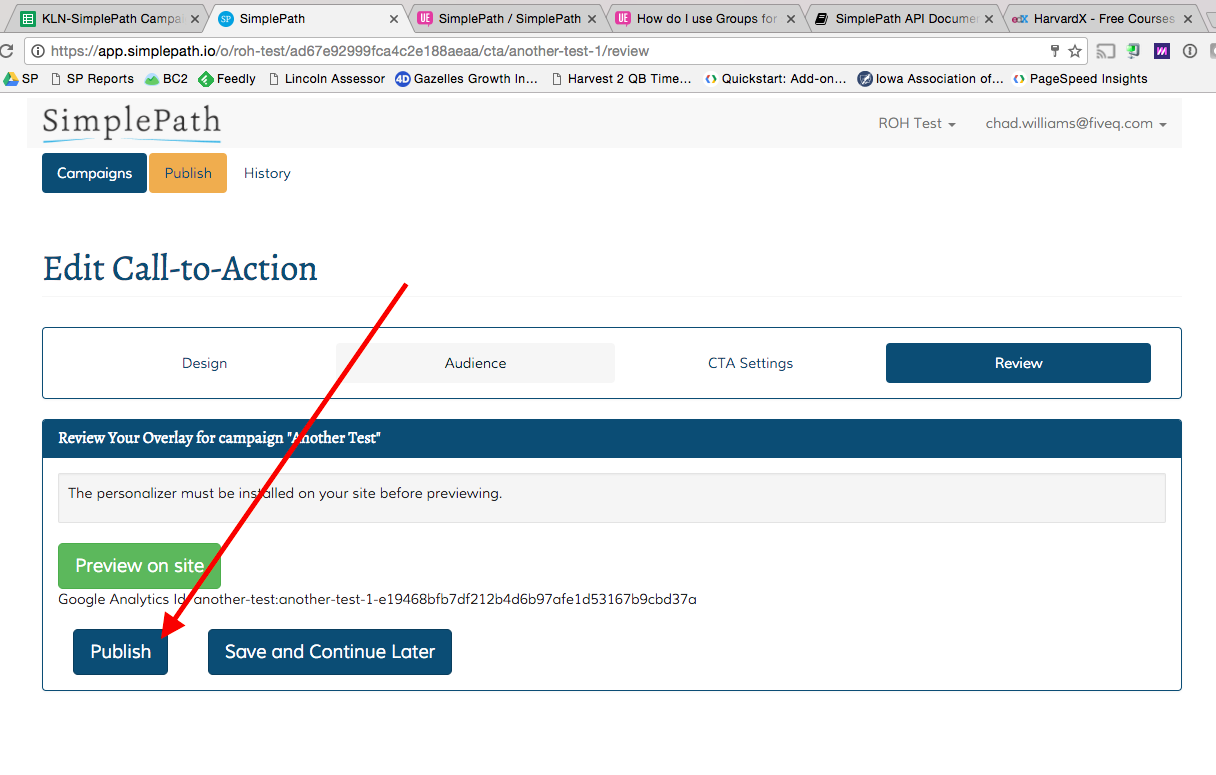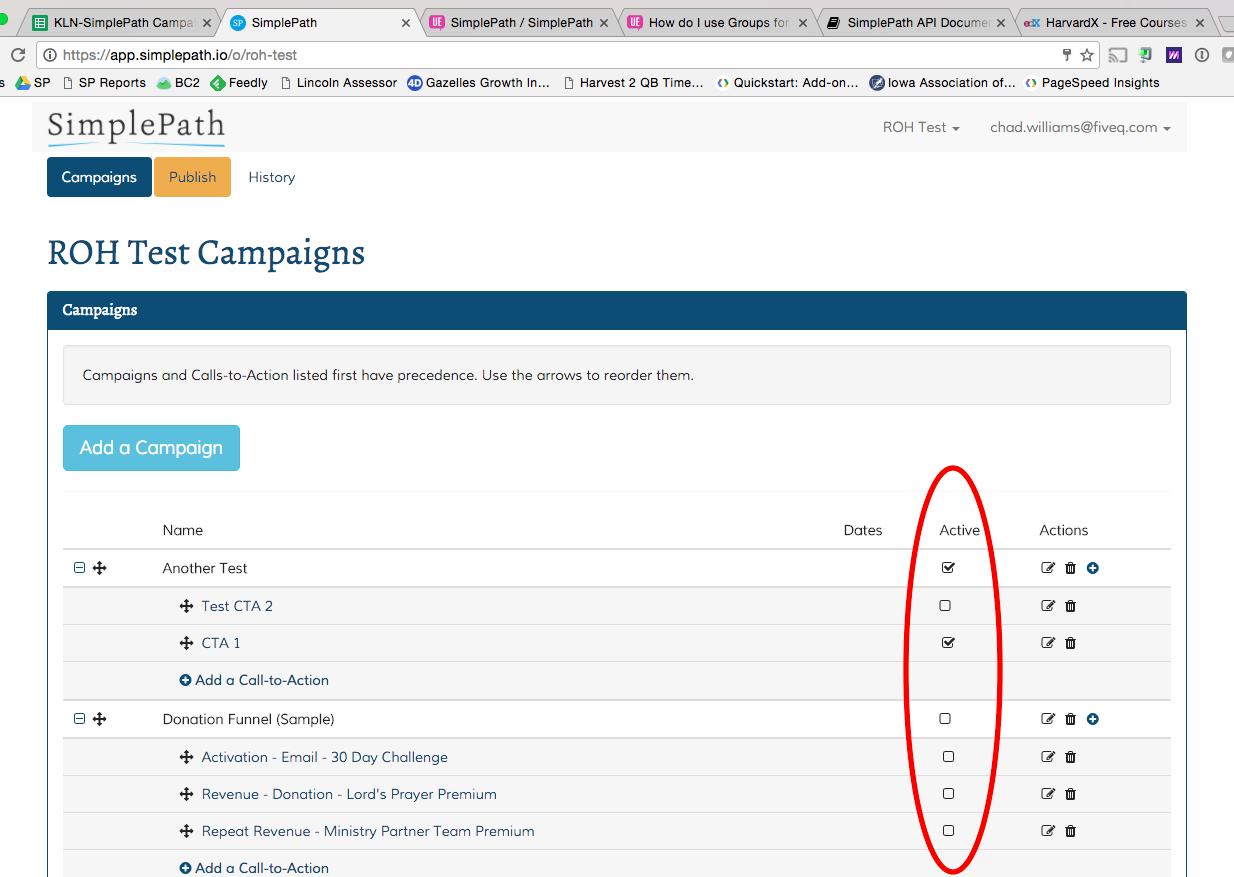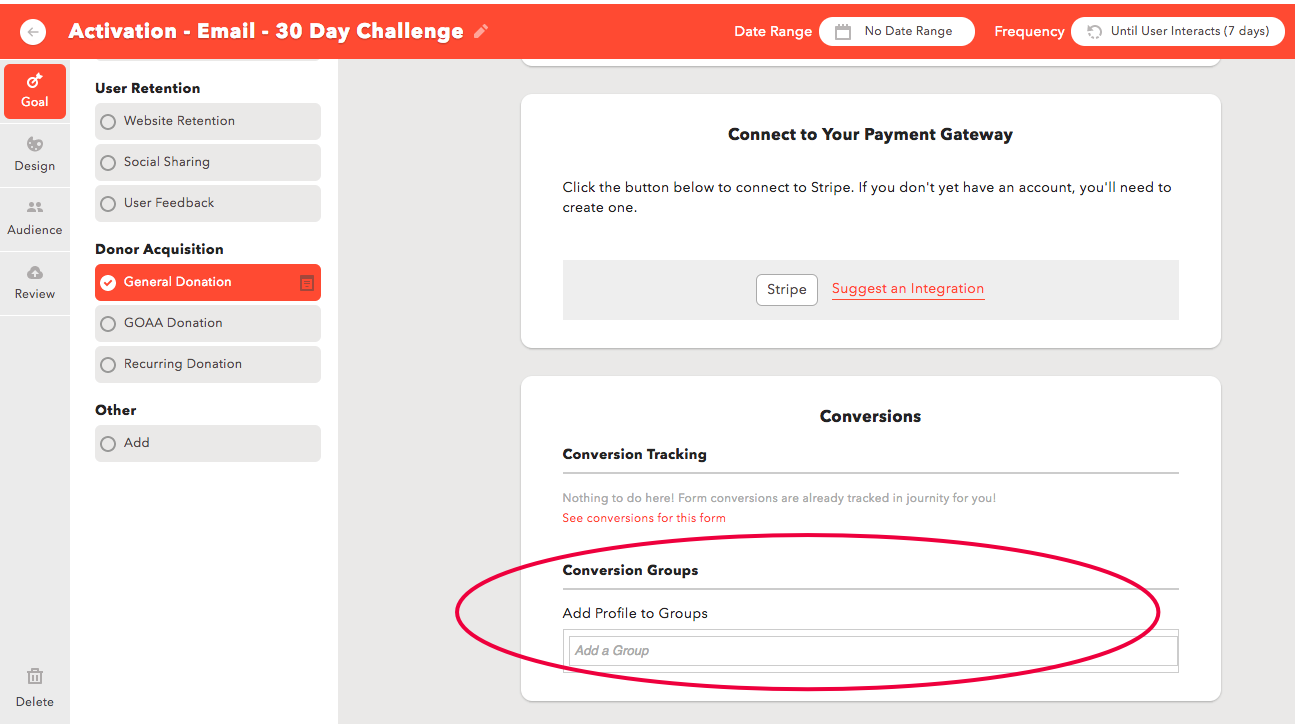All feedback, ideas, improvements for Journity are welcome.
 When I create a new CTA and publish, it doesn't show up. Why not?
When I create a new CTA and publish, it doesn't show up. Why not?
I just created a new CTA, and went to the publish it to be live. But when it didn't show up as live after I published it. Did I do something wrong? It appears broken.

Good question! When you are on the review page, be sure to click the "Publish" button at the bottom of the page. That will make sure that the CTA is active when it gets published. (see image below):

You can also check on the Campaign Listing page, to make sure that every Campaign and CTA that you want to set live are marked as "active." (see image below)

 How do I use Groups for segmenting my audience?
How do I use Groups for segmenting my audience?
On the "audience" section of setting up a CTA, there is an ability to segment by group. How does that work?

Groups are a powerful segmentation tool that let's you segment on anything that you want. Some sample groups could include:
- Authors
- Donors
- Email subscribers
- etc.
There are 3 possible ways that you can set up / send a group into Journity:
- Option #1: Build into the Dashboard when you create certain Waypoints. e.g. In the Dashboard,
- Create a new Campaign
- Under "Goal", choose "Email Subscription" or "General Donation"
- Under "Conversions", there is an option for "Conversion Groups" that you can name the group that you would want people to be added to when they signup for email or make a donation.

- Option #2: GET Query. Add the following code to any link that links to your website (could be in emails or ad campaigns, etc.)
?journitygroup=[GROUPNAME]
Example:
https://www.reviveourhearts.com?journitygroup=Campaign102 - Option #3: Use Javascript: Review our API Documentation on how to use Javascript on your website to create groups on specific events:
If you have other suggestions on how to use, or how to set up groups, please let us know!
Chad
 How can we use GTM to track analytics?
How can we use GTM to track analytics?
Is it possible to use Google Tag Manager to track the analytics?

Yes, it is possible to use Google Tag Manager for managing all your SimplePath code on your website. Here are the steps for tracking analytics:
1.) Create Data Layer variables for Event Action, Event Category, Event Label. To do this, for each of those, go to "Variables", click "New", choose Data Layer Variable, give it the name and click "Create Variable". (Leave other options as default)
2.) Create a Static variable for GoogleAnalyticsID . To do this, go to variables, click new, choose type "Static", and enter your GA id, should start with "UA-".
3.) Create a trigger for SimplePath Event. To do this, go to Triggers, click new, type is "Custom", Fire On is "SimplePath"
4.) Create a SimplePath Tag. To do this:
- Go to Tags
- click New
- product is Google Analytics
- choose Universal Analytics
- click Advanced Settings.
- Tracking ID is {{GoogleAnalyticsID}}
- Track Type is Event
- Category is {{ Event Category }}
- action is {{ Event Action }}
- label is {{ Event Label }}
- Leave other options as defaults
- Click continue
- fire on is More -> SimplePath Event
Some extra information:
Basically what we're doing is creating a tag that gets fired on a custom event sent from simplepath. The event in the code is sending the label, action, and category, so we're injecting those into the tag event that is connected to google analytics through the product and analytics ID. Tags in Google Tag Manager are more than just snippets, they can also be events that you send on to other products, and can also be fired from things like Page Load, clicking on elements, etc. Anywhere you use {{ ... }} it uses that variable's value instead of a text value. You could actually skip the step of creating GoogleAnalyticsID and paste your ID directly into the Tag, but it's good practice to have that variable to use for multiple tags.
If you need help on any step, let us know!

 Global Javascript Variable/Cookie to prevent modals from displaying
Global Javascript Variable/Cookie to prevent modals from displaying
There are several architecture patterns for which it would be helpful to prevent modals from displaying for end users.
- User lands on donation form/store page
- User lands on lead gen landing page w/ form
- User lands on confirmation page after taking some action
- User takes action on a SimplePath modal
Since every organization has a different url structure for donation pages, landing pages, confirmation pages, etc. it would be great to have the ability to set a javascript variable and/or cookie for when a user takes an action, or lands on one of those pages, to not trigger a modal popup.

Thanks for the feedback, Ian! If I'm understanding your question, correctly, I think both of these can currently be handled:
- Items 1-3 above, you are requesting to prevent the CTA to show, based on a specific URL. You can currently manage these by setting the URL to be excluded at either the global settings (let us know, and we'll add them to the global exclude list), or for each CTA ("CTA > Audience" page under "Current Page URL").
- For the last item, you can set the frequency a person will see the CTA in: "CTA > CTA Settings" page under "Trigger" and "Visible," where you can set how frequent a person would see each CTA. However, please note: if a person frequently wipes out their cookies/cache, that time period would be reset each time.
If neither of these two methods don't handle what you are after, please let us know! Thanks,
Chad

 Change drag and drop icon and cursor to denote functionality.
Change drag and drop icon and cursor to denote functionality.
I only figured out that you could drag and drop the campaigns by accidentally clicking on the two arrows when I was trying to click on the plus sign. This icon is more globally known as drag and drop:
Another way to do this would be to make the entire row drag and droppable, instead of just an icon. Though a specific target is probably easier.

We have updated the home page to use the different icon, Alex! Thanks for the feedback!
Thanks,
Chad

Use the API’s “group” feature. Follow the following steps:
- Determine what you want to name your group (e.g. “30-day-challenge-husband”)
- Add the code to the “thanks” page to add the group, based on https://s3.amazonaws.com/fiveqsimplepath/docs/index.html#groups
- Note in the campaign spreadsheet to exclude those group members
- Let FiveQ know in basecamp.

Here is an example of a custom form that is built right into the CTA:
For custom forms, typically what we do is call a javascript function that displays a modal that's already somewhere on your page, but hidden. Do you already have a means of displaying modals on the page?
If not, http://jquerymodal.com/ is a pretty simple way of making one if you already use jquery. Just wrap a gravity form in:
<div style="display:none" id="form-modal">
...
</div>
and drop the jquery modal javascript on the page. Simplepath handles the audience portion (who should see the modal and when) and then just calls the modal function on that element.

The API Documentation can be found at https://s3.amazonaws.com/fiveqsimplepath/docs/index.html

Yes, it is possible. At this point, the suppression is based on IP address, and needs a bit more technical work on the ministry's side of things. But, yes, it can definitely be done, if you have the IP address for each subscriber. Right now, our team will need to work with you individually to set things up.

Here are a few ministries that currently a part of the SimplePath Beta program. You may, or may not see a CTA, depending on the engagement levels and segments that they are setting for their campaigns: Revive Our Hearts, Open Doors, Bibles For The World, Life Action Ministries, Moody Media, KTIS, GMI and others.
Customer support service by UserEcho


